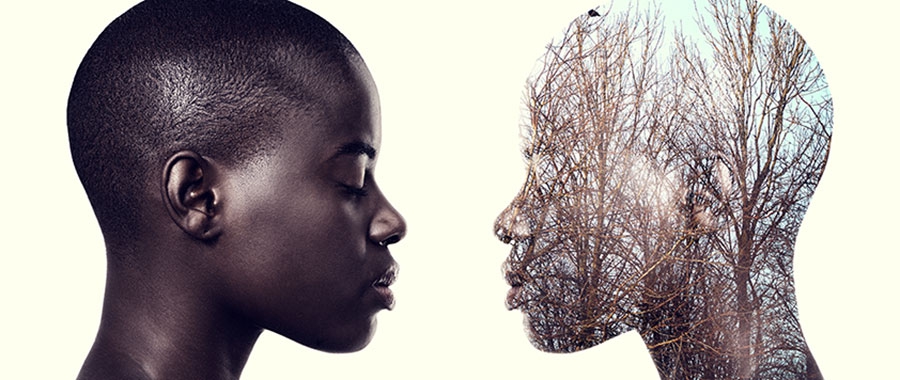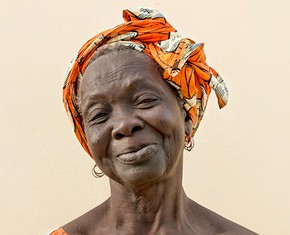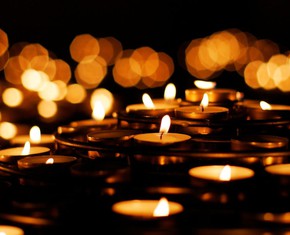The views expressed in our content reflect individual perspectives and do not represent the authoritative views of the Baha'i Faith.
Addressing a crowd of 10,000 in Helsinki, Finland’s capital, on a Saturday in October, 15-year-old Greta Thurnberg called on all humanity to change. She said:
Today we use 100 million barrels of oil every day. There are no politics to change that. There are no rules to keep that oil in the ground, so we can’t save the world by playing by the rules because the rules have to change. Everything needs to change and it has to start today.
Let’s stand back a bit from this brave declaration and imagine the typical responses. “Young and idealistic; they’ll learn,” “It’ll never happen,” “Everyone else will need to do something first,” and “It’s just human nature, isn’t it?”
Are humans selfish animals, little more than bags of randomly assembled molecules, doomed to shuffle off this mortal coil to inevitable oblivion and individual extinction? It’s not unreasonable to ask “Is this it?” The fear of oblivion and the purposelessness of our existence drives us to give up, to party like there is no tomorrow, because we believe there isn’t a tomorrow. Let’s explore how this fear of oblivion and extinction may be holding us back from taking steps to deal with issues like climate change.
In 1891, Baha’u’llah, the prophet and founder of the Baha’i Faith, wrote:
In the treasuries of the knowledge of God there lieth concealed a knowledge which, when applied, will largely, though not wholly, eliminate fear. This knowledge, however, should be taught from childhood, as it will greatly aid in its elimination. Whatever decreaseth fear increaseth courage. Should the Will of God assist Us, there would flow out from the Pen of the Divine Expounder a lengthy exposition of that which hath been mentioned, and there would be revealed, in the field of arts and sciences, what would renew the world and the nations. A word hath, likewise, been written down and recorded by the Pen of the Most High in the Crimson Book which is capable of fully disclosing that force which is hid in men, nay of redoubling its potency. We implore God—exalted and glorified be He—to graciously assist His servants to do that which is pleasing and acceptable unto Him. – Epistle to the Son of the Wolf, p. 32.
What might this knowledge be, that could “eliminate fear?”
Starting in the 1970s, pioneering works by Elizabeth Kubler-Ross and Raymond Moody began raising awareness of near-death experiences, or NDEs. Although their early works were best-sellers, before the internet their reach was limited. However, since then much more has been published by both NDE experiencers and those who have studied them.
Websites like www.iands.org (International Association of Near Death Studies), and www.nderf.org (Near Death Experience Research Foundation) store collections of first-hand accounts of NDEs by the experiencers themselves. Most of these accounts are anonymized, because of the ridicule the experiencers faced when attempting to share what happened to them. Many accounts were only shared later, some 50 or more years after the NDE took place.
These experiences have many features in common, such as:
- an all pervading feeling of unconditional love
- being ‘at one’ and ‘merging’ with the source of that love
- an overwhelming sense of unity with nature and the universe
- recognition that there are no limits, no labels, only love
- being shocked by how important it is to love others
- learning to ‘be’ and cease worrying
- becoming aware of having an uncompleted purpose
- a clearer recollection than other memories, even many years later.
By far the majority of near-death experiencers have a reduced or completely eliminated fear of death. The experiencer simply no longer fears dying; they know life continues after the physical demise of the body.
A woman who experienced one of these NDEs (recounted on the nderf.org website) uses very clear language to show the feelings she had, and the effect the experience had on her attitude toward life:
Awareness of self as being present while observing medical staff suddenly going into resuscitation mode—realizing I still existed and was not afraid (contrary to previous earthly experience of being young, single mom raising a three year old and questioning Meaning of existence) … I was told … The people on earth need to know all that you have witnessed and experienced. That their experience is not the totality of existence, but a crucial part of the overall plan. … Could ’see’, understand, that my fear was an obstacle to coming to know God and His presence, not only for me, but also for all. That was the overriding message, the root of all evil in this world … I need to express to anyone who has an ear to hear, and an eye to see that we exist within a much larger dimension that is exquisitely designed and available to all. Ironically, our fears can keep us from experiencing this reality here, because of all the strife and dissension with one another, and within ourselves. I speak, mostly one on one with others, and feel called to disseminate this experience, knowledge, much more widely.
When I read this account, and compared it with Baha’u’llah’s quote above, I had just about the strongest shiver up my spine that I have ever experienced.
I began to wonder—could this fear that Baha’u’llah spoke about mean fear of death, fear of non-existence, or a fear of existence having no meaning? This sentence from the account particularly moved me: “ … my fear was an obstacle to coming to know God and His presence, not only for me, but also for all …”
How many of us are aware of this prize “concealed in the treasuries of the knowledge of God?” What effect would removing or eliminating the fear of death in teaching children have? What about making this life-changing awareness available as materials for small group and active learning for older people? Just consider for a few moments the revolutionary impact that increasing courage in the face of death would have on our attitudes regarding who we are, what we are here for, and what we can do!
Dr. Penny Sartori, writing about NDEs in her book The Wisdom of Near-Death Experiences, said:
Imagine if everyone changed their perspective on life and saw each other as interconnected and valuable people … What if everyone put the needs of others before their own needs? How radically transformed the whole world would be. – p. 185.
This fresh and new, yet timeless, perspective offered by the Baha’i teachings and these thousands of accounts can largely eliminate our fear of death—and in doing so increase our courage. With courage, what happens to the paralysis of will that prevents humanity from taking urgent action to tackle climate change? What would this huge change in our understanding of human nature do to our willingness to place trust in others?
The Baha’i teachings reassure us that our souls will live forever, and that our suffering has meaning:
In every suffering one can find a meaning and a wisdom. But it is not always easy to find the secret of that wisdom. It is sometimes only when all our suffering has passed that we become aware of its usefulness. What man considers to be evil turns often to be a cause of infinite blessings. – Shoghi Effendi, The Unfolding Destiny of the British Baha’i Community, p. 434.
Sometimes we need to be sorely tested, pushed to our uttermost limits, before we understand and appreciate the gems that lay hidden within each of us. To change the rules of the world we live in, we need to transform ourselves first—and we need courage to create that transformation. It turns out the source of that courage is so very much closer to all of us than we think!
You May Also Like
Comments

















The bestowal and grace of God have quickened the realm of existence with life and being. For existence there is neither change nor transformation; existence is ever existence; it can never be 89 translated into nonexistence
PUP page 88